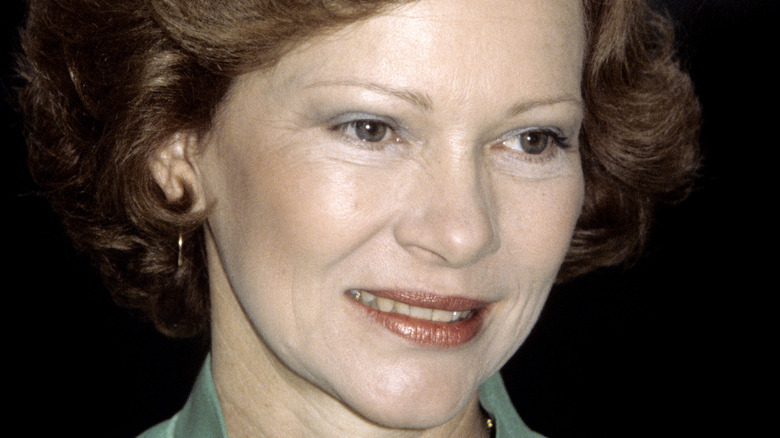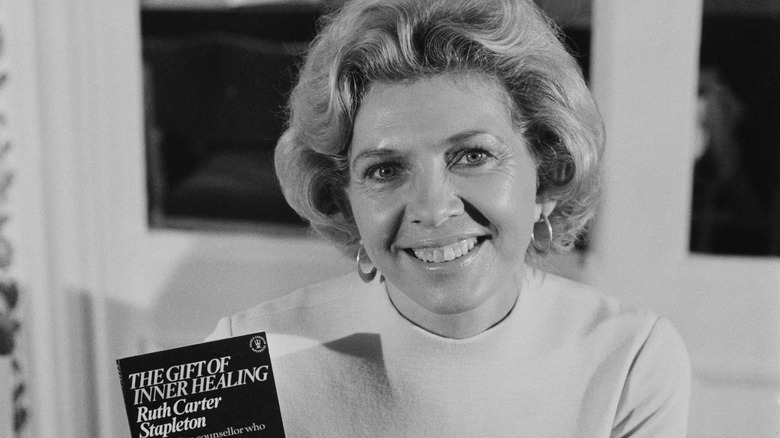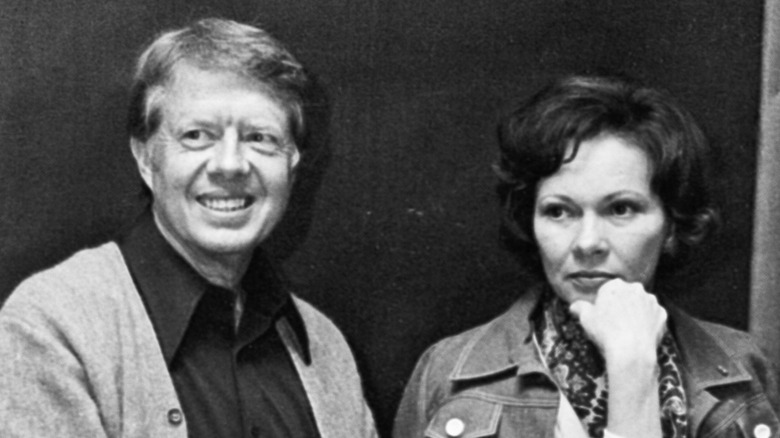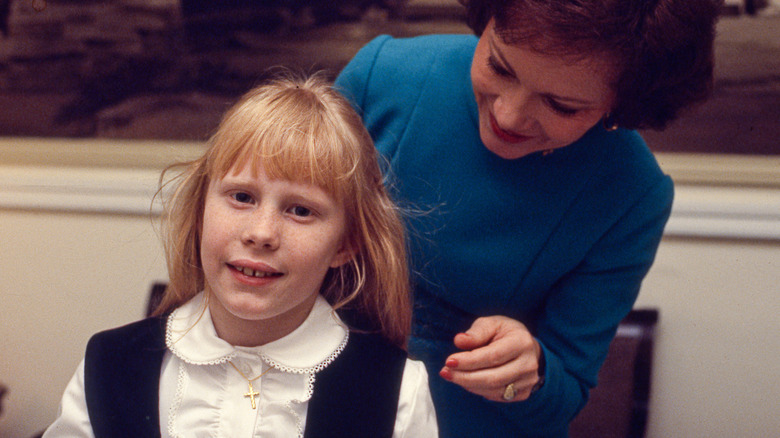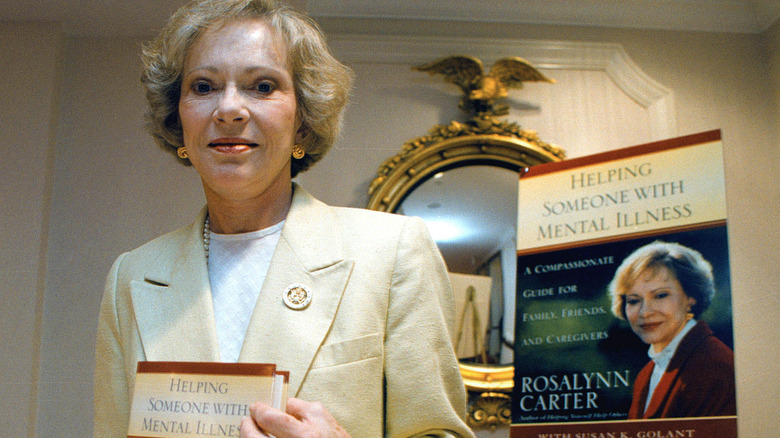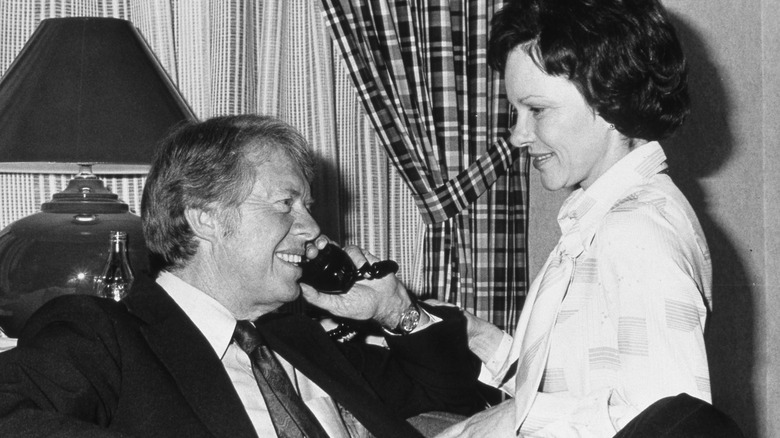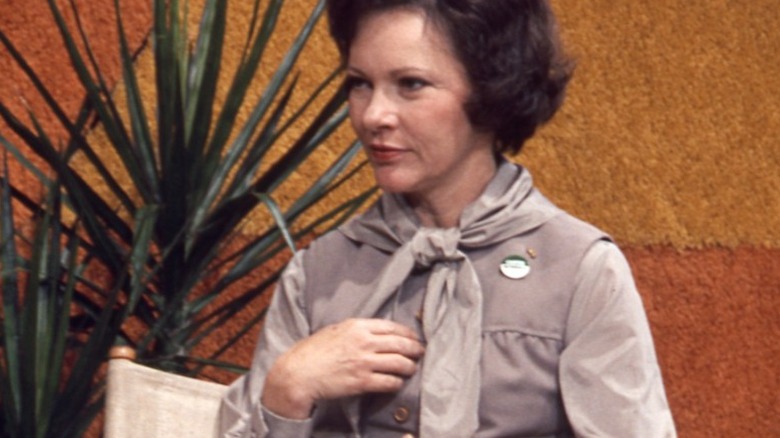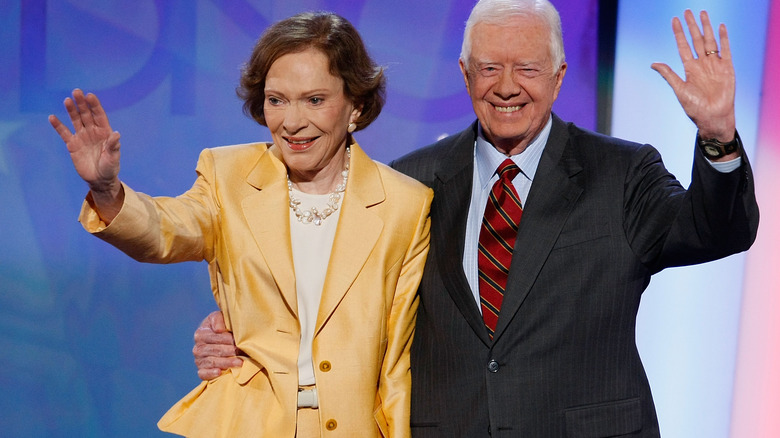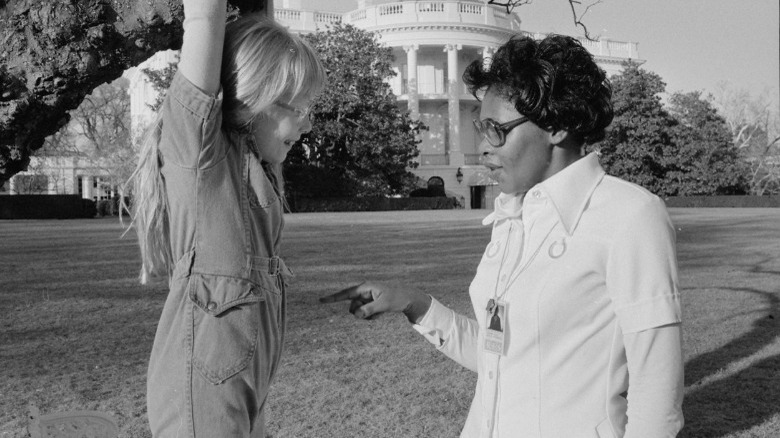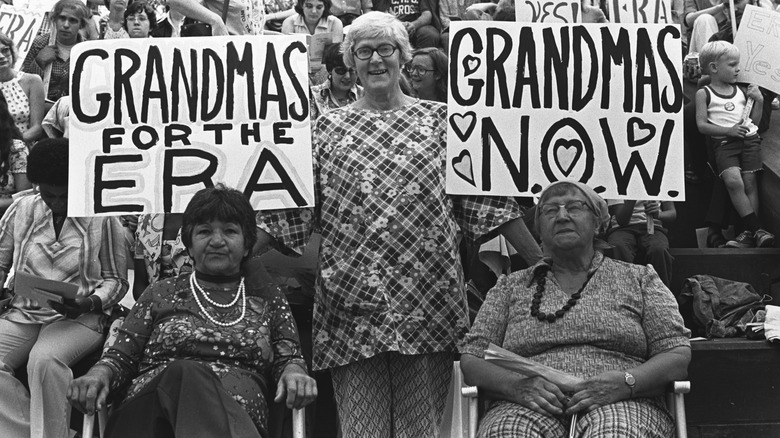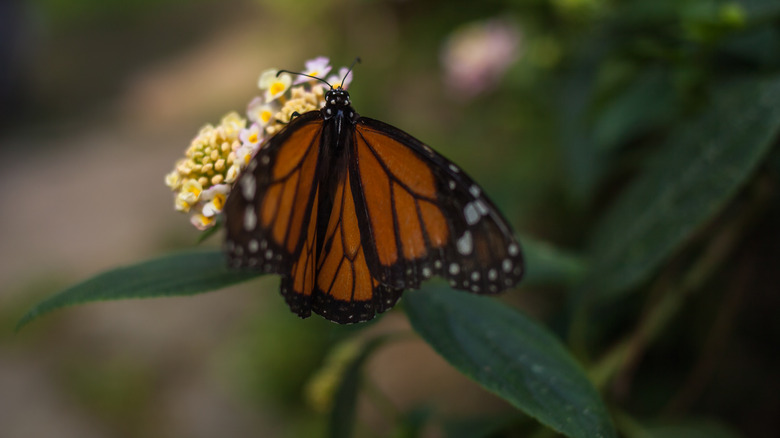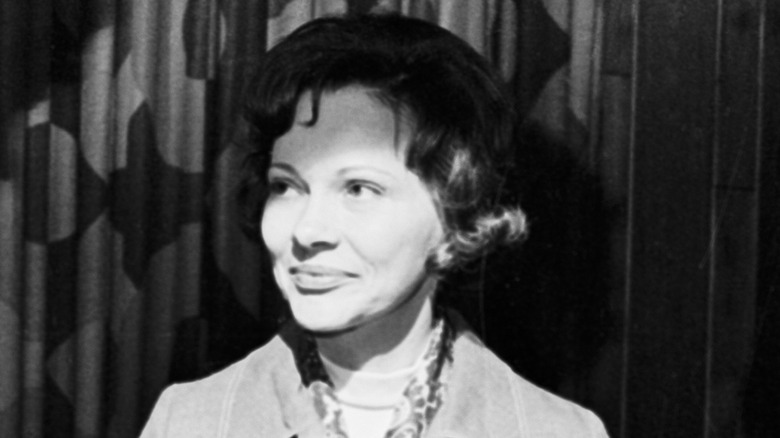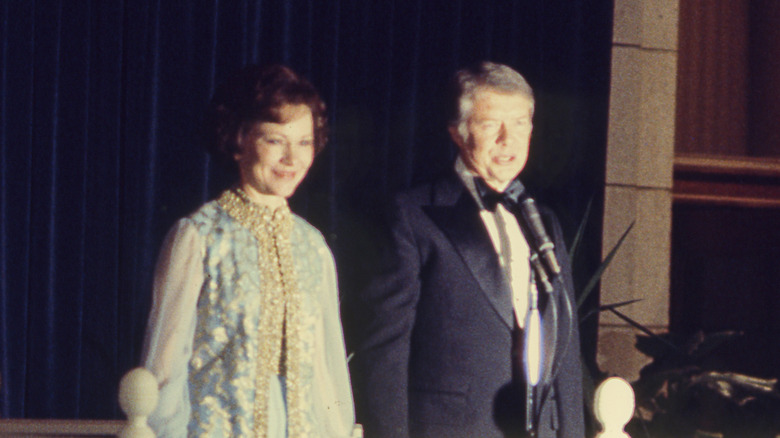12 Facts About Former First Lady Rosalynn Carter
There have been, perhaps, more famous first ladies of the United States. Abigail Adams is the best-known woman of the founding generation, Eleanor Roosevelt represented America to the United Nations, and Mary Todd Lincoln has a reputation in popular culture — deserved or not — for being mad. But the woman most responsible for shaping the role of first lady of the United States for the modern era is Rosalynn Carter.
According to The Miller Center, it was Carter who first organized the Office of the First Lady into designated departments (and who granted the staff under her that organizational title). She was also the first to hire a chief of staff, and to directly engage on substantive issues when acting as the president's envoy on official diplomatic trips. Her husband Jimmy Carter relied heavily on her counsel. At times, she was referred to in the press and in books on the administration as "the Assistant President" (per The New York Times).
She also acquired the nickname "steel magnolia" for the contrast between her shy Southern charm and her firmness and ambition on matters of politics and policy. She, at times, took great pains to note her importance to her husband's work and in her own career. She and Jimmy also made history as the longest-living presidential couple, although sadly Rosalynn would precede her husband in death on November 19, 2023, at age 96. It was reported in May she had dementia.
She got to know Jimmy Carter through his sister
Rosalynn Carter enjoyed an idyllic childhood in Plains, Georgia. But the death of family patriarch Wilburn Smith when Rosalynn was 13 made her grow up quickly. As the oldest of four children, she was expected to help pick up the slack by working with her mother as a dressmaker and tending to her younger siblings.
During this period, Rosalynn's best friend was Ruth Carter, the younger sister of Jimmy. For years, Rosalynn only knew Jimmy as her neighbor and her best friend's brother. But according to Peter G. Bourne's "Jimmy Carter," she began to take notice of him when she saw his photograph in uniform at the U.S. Naval Academy. With Ruth playing matchmaker, Rosalynn and Jimmy got together during his summer leave in 1945. After just one date, Jimmy resolved to marry her.
He proposed that Christmas, but while Rosalynn was also smitten, she didn't give an immediate "yes." She was too young, she worried, and she hoped to complete her education at Georgia State College for Women. But Jimmy was persistent. After returning to the academy, he and Rosalynn exchanged regular letters, and though it meant cutting her interior design studies short, she eventually consented. Ironically, Ruth initially objected, only gradually reconciling to the match.
She almost left her husband over the peanut farm
Early in their marriage, Jimmy Carter was a naval officer, stationed here and there across the country, with Rosalynn Carter traveling with him. According to author Peter G. Bourne, the Carters were delighted with military life. With Jimmy focused on his work, Rosalynn maintained their social circle and raised their three sons. The couple made plans to retire to Hawaii after Jimmy's time in the Navy was over.
That time would be cut short, however, by the death of Earl Carter, Jimmy's father, in 1953. Left behind were his peanut farm and a collection of businesses that, per Bourne, his wife Lillian and his youngest son Billy Carter were ill-equipped to manage. Lillian was insistent that Jimmy come home and run things. But Rosalynn was equally insistent that she didn't want to go. Navy life had been good to them and offered opportunities for advancement. Life in Plains still operated on a hierarchy based around family background. Rosalynn worried about being bossed around by her mother-in-law (and her own mother), and she worried that Jimmy wouldn't be happy, being cut off from work he had enjoyed.
Jimmy himself was resolved to go home, however. When he told Rosalynn, it set off the most severe fight in their marriage, nearly ending it. He was stubborn, but she was fiercely against the move. Only after much crying and screaming did she reluctantly agree to go back with him.
She could only have her daughter after surgery
Jimmy and Rosalynn Carter had three children while in the Navy, all sons: Jack (born 1947), Chip (born 1950), and Jeff (born 1952). They were all born in different parts of the country, per Biography, and according to Jimmy Carter himself in "A Full Life: Reflections At Ninety," they were invaluable during the roughest patch of his marriage to Rosalynn. She was so upset at Jimmy for abandoning his naval career to come home to Plains, Georgia, that she only spoke to him through their eldest son, Jack.
That arrangement ended as Rosalynn and Jimmy reconciled. While he loved their boys, Jimmy wanted another child; hopefully, a girl (per "A Full Life"). Rosalynn wasn't so sure. "We had an on-and-off argument for the next 14 years," wrote Jimmy, "which I finally won." But it wasn't just reluctance on Rosalynn's part that kept them from having another baby. There were complications, which turned out to be a large tumor in Rosalynn's uterus (via "His Very Best: Jimmy Carter, A Life).
Fortunately, the tumor was found to be benign. In the late 1960s, Rosalynn underwent surgery to remove it. Not long after, she became pregnant, and on October 19, 1967, she gave birth to Amy Carter. Jimmy had his daughter, and because of the large age difference between Amy and her brothers, Rosalynn felt that Amy "had four fathers."
A chance encounter on the campaign trail led her to champion mental health
Many first ladies decide to champion a cause. For Rosalynn Carter, that cause was mental health. Contemporary reporting in The New York Times to the beginning of the Carter presidency noted her interest in the field, and according to The Miller Center, it was Rosalynn's advocacy that led to Jimmy Carter creating the President's Commission on Mental Health.
Though ethics rules prevented Jimmy from appointing a relative to chair the commission (per The Washington Post), he made Rosalynn honorary chairperson, and she was a highly visible lobbyist for the commission's work. Her efforts culminated in the passage of the Mental Health Systems Act of 1980.
Rosalynn's interest in matters surrounding mental health predated her time in the White House. In an interview with SFGATE, she credited an earlier stage in her husband's political career with bringing the issue to her attention. In 1970, Jimmy was running for governor of Georgia, and Rosalynn was on the campaign trail on his behalf.
One night, she met another campaign surrogate, a woman who worked night shifts at a cotton mill. She was clearly exhausted, the woman, as she explained to Rosalynn that she was coming home from work to look after her mentally ill daughter. It was the image of that worn-out woman, as well as additional meetings during the campaign, that moved Rosalynn to advocate on behalf of mental health services.
Campaign disputes put her in cabinet meetings
In the early days of their marriage, Jimmy and Rosalynn Carter practiced a "father knows best" style of relationship, in the words of The Washington Post. Jimmy was indisputably in charge around the house and did not discuss his work or ask Rosalynn her opinion — or permission — on major decisions. Things began to change after the Carters came home to Plains to run the family peanut farm, a move Jimmy decided on over Rosalyn's many and furious objections. She had greater business experience than Jimmy, so she took over management of the office.
That didn't represent a complete change in their marital relations, however. When Jimmy found he had political ambitions and launched his first campaign in 1962, for the state senate, he didn't say a word to Rosalynn. Jimmy claims the real turning point came when Rosalynn told him off for expecting her to pack his suitcase for the campaign trail. For her part, Rosalynn told The Glasgow Herald that Jimmy was still making decisions and statements without checking with her in his 1976 run for president.
As one of her husband's surrogates, Rosalynn felt she needed to know his mind on policy, regardless of their personal relationship (per C-SPAN). After the election, Jimmy invited his wife to sit in on cabinet meetings. Besides giving Rosalynn a chance to advise her husband, this also let her better understand the things she was expected to explain to the American people.
She called the shots on her Latin America tour
In the summer of 1977, Rosalynn Carter was sent on a two-week tour of Latin America as a representative of President Jimmy Carter. According to The Washington Post at the time, the trip was developed as Jimmy prepared a speech on Latin American policy, though just whose idea it was to send Rosalynn was hazy in recollections. "It just happened," she told reporters. "Jimmy said all during the campaign that he was going to send his family on trips around the world, that he would use his family as a surrogate."
Past first ladies had traveled across global regions on behalf of their presidents, but Rosalynn was determined to do more than a goodwill tour. There were outstanding issues surrounding beef imports, international loans, military and energy equipment, and human rights issues under various military dictatorships in the region. Rosalynn wanted to have a say on them all. In preparation for the trip, she had herself grilled on policy issues and the Spanish language, per the Post.
That an American woman would be so involved with matters of diplomacy took many heads of state by surprise. The foreign minister of Brazil, which was at odds with the U.S. at the time, didn't take kindly to some of the subjects she brought up. But leaders of Costa Rica, Venezuela, Peru, and Ecuador spoke positively of the tour (via The New York Times). And Rosalynn was keen for the American press to know when she took initiative on her own.
She has her own institutes
Jimmy Carter has enjoyed one of the most storied post-presidencies of anyone to have inhabited the White House. His nonprofit Carter Center, founded in 1982, has won international renown for its work on behalf of human rights and the promotion of democracy. Rosalynn Carter was a co-founder of the Carter Center and, according to its official website, sat on the board of trustees. She was also the brain and chairperson behind the Center's Mental Health Task Force.
But Rosalynn had her own organizations independent of the Carter Center. One of these, the Rosalynn Carter Institute for Caregivers, was established in 1987 and is dedicated to aiding millions of Americans who provide care for disabled or incapable adults and children. Rosalynn cited her personal experience helping to care for her family after her father's death, and her and Jimmy's shared experience tending to ill family members, as inspiring her to work on caregivers' behalf (per the institute's official website).
Another institute that was co-founded by Rosalynn Carter is Vaccinate Your Family, formerly known as Every Child By Two. Per its official website, this was a joint venture between her and Betty Bumpers — once the first lady of Arkansas — established in 1991 in response to the U.S. measles epidemic. The goal of Vaccinate Your Family is right there in its current name, which it acquired in 2018: to promote vaccination efforts across all 50 states.
She secured a reprieve for her daughter's nanny
As first lady and as a philanthropist, Rosalynn Carter championed groups of people and broad causes. Through the Mental Health Task Force, she's worked to improve understanding and care for mental illness (per the Carter Center); through her own Rosalynn Carter Institute for Caregivers and the Vaccinate Your Family campaigns, she promoted caregivers and public health initiatives. But she also championed causes on a more human scale.
In 1970, a Black woman named Mary Prince got mixed up in a fight between her cousin, a man, and a woman; the man was accidentally killed. According to "The Residence: Inside the Private World of the White House," Prince was advised by her court-appointed lawyer to plead guilty to win a light sentence, but she was given life for murder. She may have spent the rest of her days behind bars if she hadn't been part of a trustee program that sent prisoners to work in the governor's mansion. There, Prince was tasked with caring for the infant Amy Carter and, through her, met Rosalynn.
Familiarizing herself with Prince's case, the first lady of Georgia became convinced of her innocence. After Jimmy became president, Rosalynn wrote to the parole board in Georgia to win a reprieve for Prince. She brought Prince to the White House to act as Amy's nanny, with Jimmy as her parole officer. Prince eventually won a full pardon, and she and the Carters remain close to this day.
She fought hard for the ERA
Among the most significant political initiatives of the 1970s was the Equal Rights Amendment (ERA). It was first proposed in 1923, according to History, but took nearly 50 years to gain approval; it was passed by the House of Representatives in 1971 and the U.S. Senate in 1972. Under the language of the amendment that steered through Congress, there would be no legal distinction on the grounds of sex in matters of "divorce, property, employment, and other matters," per the National Archives.
As reported by TCU Magazine, the initial deadline for states to ratify the amendment was 1979, and Rosalynn Carter was keen to see it adopted nationally. While her background as a Southern evangelical didn't make her a natural ally to feminism through modern eyes, in the 70s, a good number of evangelicals like Carter spoke out for women's rights. Carter did work to temper the image of the ERA, presenting it in a way more appealing to moderates and the mainstream of American society.
It takes three-fourths of the states to ratify an amendment before it can take effect, and Hawaii was the first to ratify the ERA in 1972. A steady momentum to the magic number of 38 states stalled in the mid-70s, however, thanks to conservative pushback. The deadline for ratification was extended from 1979 to 1982, but despite the extra time and efforts of the Carter administration, the ERA fell three states short. Carter would describe its failure to pass as one of the biggest regrets of her husband's presidency.
She championed the monarch butterfly
Amidst her myriad interests and causes on behalf of her fellow humans, Rosalynn Carter also found time for the animal kingdom. And an oft-maligned branch of the animal kingdom at that: insects. After leaving the White House, Carter became aware of the declining population of migratory monarch butterflies and began researching which plants native to her home state of Georgia should go in her garden to provide a friendly habitat. Her example led others in Plains to join in, and soon there was a "trail" of butterfly gardens running through houses, churches, and libraries.
Eventually, this grew from personal initiative to an organization, the Rosalynn Carter Butterfly Trail. It was co-founded by Carter and Annette Wise, who currently serves as president. Per its official website, the Trail hosts an annual symposium in Plains designed to educate the public on monarch butterfly health and how to make gardens into friendly spaces for them. They also have a registry for butterfly-friendly gardens. As of 2022, the map of registered gardens shows efforts in multiple states and countries, though most are concentrated in the American South — and Georgia specifically.
Jimmy Carter's mother delivered her
Rosalynn Carter was born Rosalynn Smith on August 18, 1927, in Plains, Georgia. Her parents were Wilburn Edgar Smith and Frances Allethea "Allie" Murray, who would have three more children after Rosalynn. The family was not well off; Wilburn juggled farming with auto work and bus driving to make ends meet. But Plains was a supportive community. With only 600 residents at the time, many families knew each other well.
Among those the Smiths knew well were their next-door neighbors, the Carters, and their young son Jimmy. The future president was 3 years old when Rosalynn was born. Carter's mother, Lillian, was a nurse, and she volunteered her help when Rosalynn came into the world. After helping to deliver the baby, she brought Jimmy over to meet her the next day. "He looked through the cradle bars and saw me," Rosalynn told The Washington Post decades later. That was as far as things went, at least until their teenage years.
Her inaugural gown caused controversy
When Jimmy Carter was inaugurated as governor of Georgia on January 12, 1971, Rosalynn Carter wore a blue gown with gold trim paired with an embroidered sleeveless overcoat. When her husband was inaugurated as president of the United States on January 20, 1977, Rosalynn decided to wear the same gown. Besides being something of a family tradition, the choice reflected the frugal nature of the Carters.
But critics in the American fashion industry were not charmed by the sentimental link to the Carters' past, or to their efforts to show economy. At the time, the first lady was expected to help promote American designers and, more broadly, project a certain degree of glamour and elegance. While Rosalynn made some effort to silence critics with visible purchases of trendy outfits, her tastes remained conservative.
According to Scott Kaufman's "Rosalynn Carter: Equal Partner in the White House," other sectors of the clothing business appreciated Rosalynn's look, and what she wore hardly mattered at all to Americans' choice in wardrobe. But the controversy over her dress fit into a larger body of critiques of Rosalynn as first lady and White House hostess. People complained about the food she served, the absence of hard drinks from the White House in her time, and her lack of interest in decorating.
